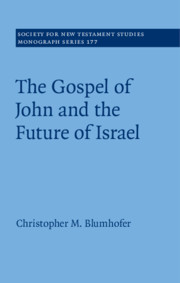Book contents
- The Gospel of John and the Future of Israel
- Society for New Testament Studies
- The Gospel of John and the Future of Israel
- Copyright page
- Dedication
- Contents
- Acknowledgments
- 1 Introduction
- 2 Announcement: John 1–4
- 3 Debate: John 5–10
- 4 Crisis: John 11–20
- 5 Conclusion: Implications for the Interpretation of John
- Select Bibliography
- Index
3 - Debate: John 5–10
Published online by Cambridge University Press: 16 January 2020
- The Gospel of John and the Future of Israel
- Society for New Testament Studies
- The Gospel of John and the Future of Israel
- Copyright page
- Dedication
- Contents
- Acknowledgments
- 1 Introduction
- 2 Announcement: John 1–4
- 3 Debate: John 5–10
- 4 Crisis: John 11–20
- 5 Conclusion: Implications for the Interpretation of John
- Select Bibliography
- Index
Summary
In chapters 5–10, John presents the identity and significance of Jesus in light of the principal feasts of the Ioudaioi, first at an unnamed feast (John 5), then around the time of Passover (John 6), then at the festival of Sukkot (John 7–10:21), and finally at the Festival of Dedication (10:21–42). These festivals organize the chronology of the narrative, and they provide a context for the symbols and expectations that illuminate Jesus’ identity. The claims that John makes about Jesus in the context of these festivals also provoke increasing conflict between Jesus and the Ioudaioi (or, as John occasionally calls them, “the Pharisees,” or “the chief priests and the Pharisees”). The aim of this chapter is to consider this section of John’s Gospel as one that characterizes Jesus as one who offers innovative continuity between the past and the future for the people of God in terms of the specific observances that nurtured the memories of Israel and also shaped their expectations. How does Jesus relate to the past that these festivals recall? How does he fulfill the hopes they nurture? How do both innovation and continuity account for John’s characterization of Jesus and the growing conflict with the Ioudaioi?
- Type
- Chapter
- Information
- The Gospel of John and the Future of Israel , pp. 103 - 175Publisher: Cambridge University PressPrint publication year: 2019

